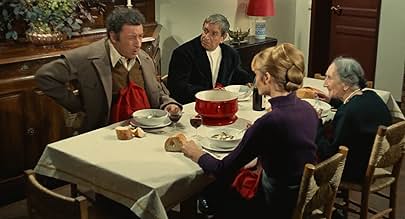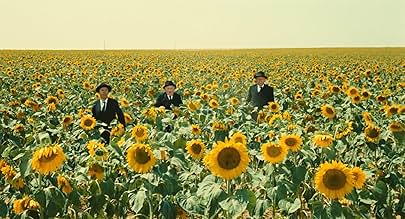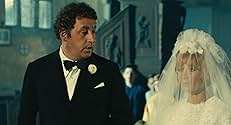VALUTAZIONE IMDb
7,3/10
2385
LA TUA VALUTAZIONE
Aggiungi una trama nella tua linguaAlexandre, a young and honest farmer under the yoke of an authoritarian wife, works around the clock in the fields. When she dies in a car accident, it's a holiday for Alexandre.Alexandre, a young and honest farmer under the yoke of an authoritarian wife, works around the clock in the fields. When she dies in a car accident, it's a holiday for Alexandre.Alexandre, a young and honest farmer under the yoke of an authoritarian wife, works around the clock in the fields. When she dies in a car accident, it's a holiday for Alexandre.
Trama
Lo sapevi?
- ConnessioniFeatured in Le bal des casse-pieds (1992)
- Colonne sonoreLe Ciel, la Terre et l'Eau
Music by Vladimir Cosma
Lyrics by Francis Lemarque
Performed by Isabelle Aubret
Recensione in evidenza
Yves Robert passed away three years ago and any cine buff remembers him for his towering achievements that are: "la Guerre des Boutons" (1962), an adaptation of Louis Pergaud's famous novel still fresh today as it was forty three years ago, "my Father's Glory" and "my Mother's Castle" (1990), adaptations of Marcel Pagnol's childhood memories. And don't forget a good pack of quality comedies treated with respect and no vulgarity. This flick, "Alexandre le Bienheureux" (1967) largely deserves its place of winner among them.
In 1880, Paul Laforgue wrote and published an essay entitled: "le Droit à la Paresse" (the Right to Laziness) in which he offered a positive definition about this term generally considered as one of the biggest vices in the world. But Laforgue shelved the negative prejudices about it. He suggested to leave work fallow and to devote free time to rest and leisure which enabled a beneficial development for the individual. I suppose Yves Robert did the same for his movie. Without taking itself too seriously, it presents itself as a comical tale in which laziness is praised because thanks to it, happiness and the possibility to enjoy basic pleasures of life prevail. There's no need to worry about the constraints and stress imposed by work and modern society. And in the background, there's this country filmed with love and delicacy which Robert seems to know like the back of his hand.
Seen today, the movie displays a few technical flaws that weren't noticeable in 1967. Certain shots or camera movements are dated and it lets us think that the movie on a technical level hasn't worn well. But it has no importance for it kept an undeniable charm and can be watched with pleasure again. And a few funny moments in Robert's work evoke the devastating humor coming from Tex Avery's cartoons like the orchestra in front of Alexandre's house.
Philippe Noiret in the main role acts the role of Alexandre with an admirable easiness and naturalness. Because of its physical appearance and as he is inseparable from his dog Kaly, he is akin to Obélix with his tiny dog Idéfix. The rest of the cast follows him well and includes Pierre Richard and Jean Carmet.
At the level of the quality in Robert's filmography, "Alexandre le Bienheureux" is just a few notches below Robert's flicks I previously mentioned. It's the kind of movie to full savor after a hard day's work or after a Jean Luc Godard intellectual movie. Given that it is difficult to find in DVD, it deserves to be restored in favor and considering all the favors did by Kaly to his master, Robert's movie perfectly illustrates the famous maxim: "man's best friend is the dog".
In 1880, Paul Laforgue wrote and published an essay entitled: "le Droit à la Paresse" (the Right to Laziness) in which he offered a positive definition about this term generally considered as one of the biggest vices in the world. But Laforgue shelved the negative prejudices about it. He suggested to leave work fallow and to devote free time to rest and leisure which enabled a beneficial development for the individual. I suppose Yves Robert did the same for his movie. Without taking itself too seriously, it presents itself as a comical tale in which laziness is praised because thanks to it, happiness and the possibility to enjoy basic pleasures of life prevail. There's no need to worry about the constraints and stress imposed by work and modern society. And in the background, there's this country filmed with love and delicacy which Robert seems to know like the back of his hand.
Seen today, the movie displays a few technical flaws that weren't noticeable in 1967. Certain shots or camera movements are dated and it lets us think that the movie on a technical level hasn't worn well. But it has no importance for it kept an undeniable charm and can be watched with pleasure again. And a few funny moments in Robert's work evoke the devastating humor coming from Tex Avery's cartoons like the orchestra in front of Alexandre's house.
Philippe Noiret in the main role acts the role of Alexandre with an admirable easiness and naturalness. Because of its physical appearance and as he is inseparable from his dog Kaly, he is akin to Obélix with his tiny dog Idéfix. The rest of the cast follows him well and includes Pierre Richard and Jean Carmet.
At the level of the quality in Robert's filmography, "Alexandre le Bienheureux" is just a few notches below Robert's flicks I previously mentioned. It's the kind of movie to full savor after a hard day's work or after a Jean Luc Godard intellectual movie. Given that it is difficult to find in DVD, it deserves to be restored in favor and considering all the favors did by Kaly to his master, Robert's movie perfectly illustrates the famous maxim: "man's best friend is the dog".
- dbdumonteil
- 8 set 2005
- Permalink
I più visti
Accedi per valutare e creare un elenco di titoli salvati per ottenere consigli personalizzati
- How long is Very Happy Alexander?Powered by Alexa
Dettagli
- Data di uscita
- Paese di origine
- Sito ufficiale
- Lingua
- Celebre anche come
- Very Happy Alexander
- Luoghi delle riprese
- Aziende produttrici
- Vedi altri crediti dell’azienda su IMDbPro
- Tempo di esecuzione1 ora 40 minuti
- Mix di suoni
- Proporzioni
- 1.85 : 1
Contribuisci a questa pagina
Suggerisci una modifica o aggiungi i contenuti mancanti

Divario superiore
By what name was Alexandre... un uomo felice (1968) officially released in India in English?
Rispondi





























